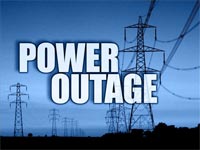This news item expired on Tuesday, April 30, 2013 so the information below could be outdated or incorrect.
There are many reasons we might lose our electricity for a time. A storm or strong wind might knock out power, or a wreck on a nearby road could cause a utility pole to fall. Although most power outages are short-lived, you never know when a major storm or other event could cause you to lose  power for days.
power for days.
No matter what causes a power outage, it’s one situation that we all experience at one time or another. Having a preparedness kit on hand when the power goes out will be something you’re bound to appreciate! Look below for some simple ways you can be prepared for a loss of electricity at your home or business.
Prepare Ahead of Time
-
To begin preparing, you should build an emergency kit that contains a 3-day supply of food, water and other non-perishables for everyone in your household. Don’t forget the family pets!
-
Fill plastic containers with water and place them in the refrigerator and freezer if there's room. Leave about an inch of space inside those you put in the freezer, because water expands as it freezes. This chilled or frozen water will help keep food cold during a temporary power outage, by displacing air that can warm up quickly with water or ice that keeps cold for several hours without additional refrigeration.
-
Be aware that most medication that requires refrigeration can be kept in a closed refrigerator for several hours without a problem. If unsure, check with your physician or pharmacist.
-
Keep your car tank at least half full because gas stations rely on electricity to power their pumps.
-
Know where the manual release lever of your electric garage door opener is located and how to operate it. Garage doors can be heavy, so know that you may need help to lift it.
-
Keep a key to your house with you if you regularly use the garage as the primary means of entering your home, in case the garage door will not open.
After the Power Goes Out
-
Use only flashlights for emergency lighting. NEVER use candles during a power outage due to extreme risk of fire.
-
Keep refrigerator and freezer doors closed to keep your food as fresh as possible. If you must eat food that was refrigerated or frozen, check it carefully for signs of spoilage.
-
Turn off or disconnect appliances, equipment (like air conditioners) or electronics that were in use when the power went out. Power may return with momentary "surges” or “spikes” that can damage computers as well as motors in appliances like the air conditioner, refrigerator, washer or furnace.
-
Do not run a generator inside a home or garage.
-
Do not connect a generator to a home's electrical system. If you use a generator, connect the equipment you want to run directly to the outlets on the generator.
-
Listen to local station on a battery operated radio or to a battery- or generator-powered television for updated information.
-
Leave on one light so that you'll know when your power returns.
-
Use a standard telephone handset, cell phone, radio or pager. Many telephones require electricity to work, as do cordless phones and answering machines. Use the phone for emergencies only. Listen to a portable radio for the latest information.
-
Do not call 9-1-1 for information—call only to report a life-threatening emergency.
-
Take steps to remain cool if it is hot outside. In intense heat when the power may be off for a long time, consider going to a movie theater, shopping mall or “cooling shelter” that may be open in your community. If you remain at home, move to the lowest level of your home, since cool air falls. Wear lightweight, light-colored clothing. Drink plenty of water, even if you do not feel thirsty.
-
Put on layers of warm clothing if it is cold outside. Never burn charcoal for heating or cooking indoors. Never use your oven as a source of heat. If the power may be out for a prolonged period, plan to go to another location (the home of a relative or friend, or a public facility) that has heat to keep warm.
-
Provide plenty of fresh, cool water for your pets.
-
Eliminate unnecessary travel, especially by car. Traffic signals will stop working during an outage, creating traffic congestion.
-
Remember that equipment such as automated teller machines (ATMs) and elevators may not work during a power outage.
After a Blackout Throw Out Unsafe Food:
-
Throw out any foods (meat, poultry, fish, eggs and leftovers) that have been exposed to temperatures higher than 40° F (4° C) for 2 hours or more, and any food that has an unusual odor, color or texture, or feels warm to touch.
-
Never taste food or rely on appearance or odor to determine its safety. Some foods may look and smell fine, but if they have been at room temperature too long, bacteria causing food-borne illnesses can start growing quickly. Some types of bacteria produce toxins that cannot be destroyed by cooking.
-
If food in the freezer is colder than 40° F and has ice crystals on it, you can refreeze it.
-
If you are not sure food is cold enough, take its temperature with the food thermometer. Remember to throw away any foods (meat, poultry, fish, eggs and leftovers) that have been exposed to temperatures higher than 40° F (4° C) for 2 hours or more, and any food that has an unusual odor, color or texture, or feels warm to touch. When in doubt, throw it out!
For more information, go to www.buncombecounty.org/preparedness or www.ready.gov/blackouts.